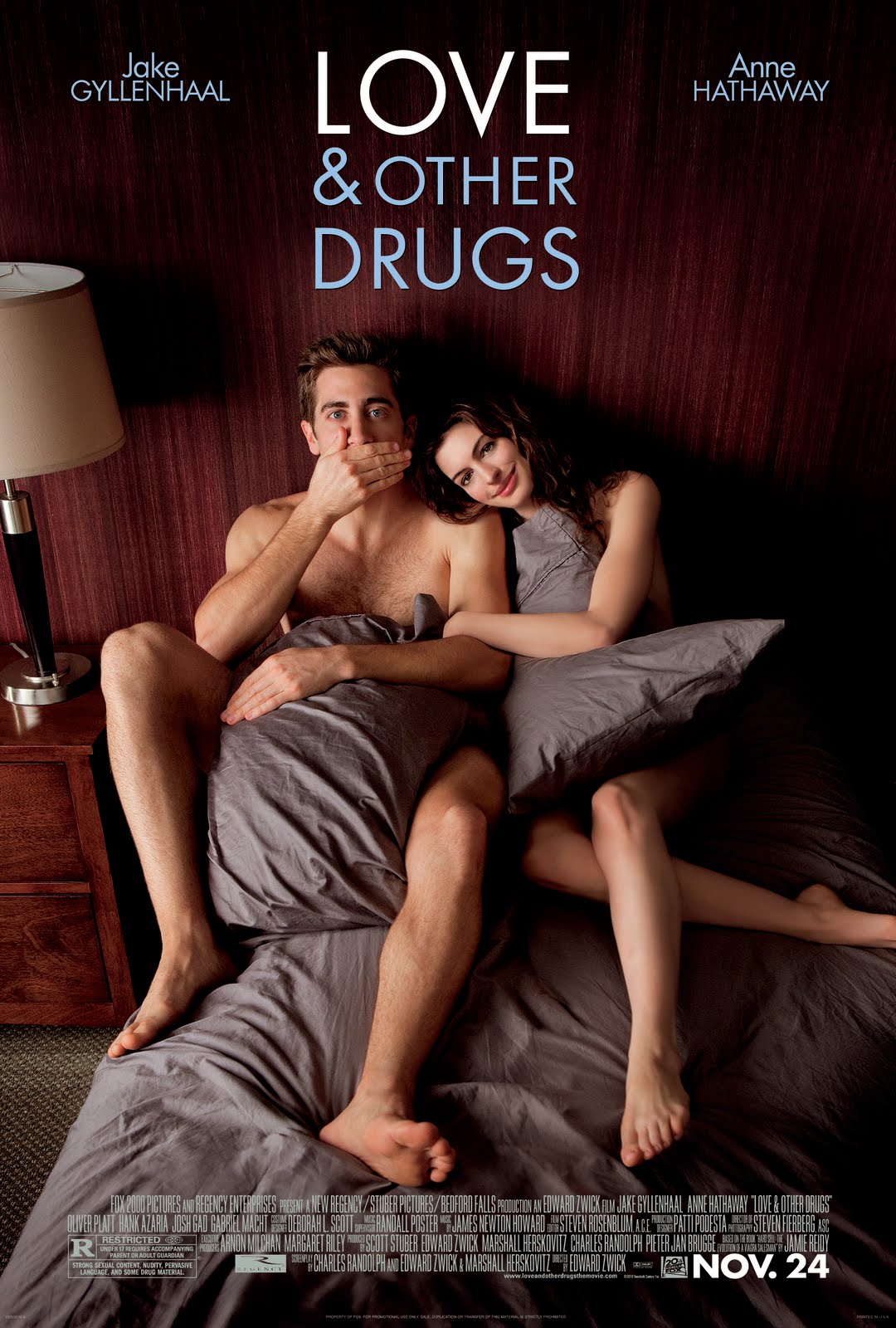In Love & Other Drugs, Jake Gyllenhaal plays a Pfizer drug rep hawking Viagra, Zoloft, and Zithromax. If only he had a schizophrenia drug that he could have sold to the filmmakers. Of all the strange concoctions in movies we’ve seen this year, Love & Other Drugs provides one of the most unfortunate– a bizarre mash-up of Judd Apatow-style raunchy humor and Nicholas Sparks-style, maudlin heartstring-tugging.
It’s unfortunate, because Gyllenhaal and co-star Anne Hathaway turn in two of the best performances of the year.
If the whole equaled the sum of the parts here, we’d have a surefire Oscar contender. As it is, though, Love & Other Drugs is a showcase for great acting that’s also a crash course on how to put talent before story.
The year is 1996. The Macarena is still all the rage, Clinton’s wrapping up his first term, and young Jamie Randall (Gyllenhaal) is displaying his smooth-talking salesmanship in an electronics store. After getting fired for schtupping a co-worker (the boss’ girlfriend, no less) he decides it might be a good time to try pharmaceutical sales. Recall, if you will, the mid-90s, when all of a sudden pharma ads were as ubiquitous as Alanis Morissette tunes… and Pfizer led the way.
Shadowing a doc in clinic one day (under the pretense of being a medical intern), Jamie first lays eyes on Maggie Murdock (Hathaway), a 26-year-old Parkinson’s patient. Their ‘meet-cute’ consists of his getting a peek of her breasts during her exam. When she finds out that he’s a slimy drug rep, she whacks him repeatedly with her purse. And true love is born.
Jamie is instantly smitten with Maggie, but getting involved in a relationship is near the bottom of her list of things to do– followed only by ‘getting a root canal’ and ‘vacationing in a Turkish prison’. All of a sudden the womanizing slick talker has a real challenge. Of course Maggie gives in pretty quickly (it’s Jake Gyllenhaal, for goodness’ sake), but only if it’s a no-strings-attached, purely physical ‘relationship’. So, they have sex (and lots of it) in alleys, back rooms, on floors, etc.
Eventually, though, Jamie starts falling for Maggie (it’s Anne Hathaway, for goodness’ sake), so she immediately freaks out and pushes him away, because, you know, she has Parkinson’s, and she can’t possibly ask him to be with her in sickness and in health.
The rest of the movie goes pretty much the way you expect it to, including a scene you would swear is taken straight from the pages of Jerry Maguire (…from 1996. Coincidence?)
Yes, Love & Other Drugs ends up feeling very clichéd, but it didn’t need to. The first half-hour offers some very funny, very raunchy bits– most involving Jamie’s porn-addicted, live-in younger brother (Josh Gad). But then things proceed to flip-flop between more raunch (the introduction of Viagra is excellent fodder) a teary storyline about Maggie dealing with her Parkinson’s (and Jamie dealing with Maggie dealing with her Parkinson’s), and a schmaltzy-ish love story between two people who need to just get over themselves and get together.
Director (and co-screenwriter) Ed Zwick has proven that he knows how it’s done; his Glory and Legends of the Fall are both worthy Oscar-winners. Why he chose to depart from his wheelhouse with Love & Other Drugs is a bit of a mystery, but all is not lost. Gyllenhaal and Hathaway are both superb, turning in performances that, in any other year, might well have earned nominations themselves. They share amazing chemistry (which we first glimpsed watching them co-star in 2005’s Brokeback Mountain), and they can both carry a scene without saying a word.
With a little (script-) doctor’s attention, Love & Other Drugs could have been something memorable. As it is, it’s little more than a placebo– it’ll make you feel okay, but only until you think about it.
3/5 stars
